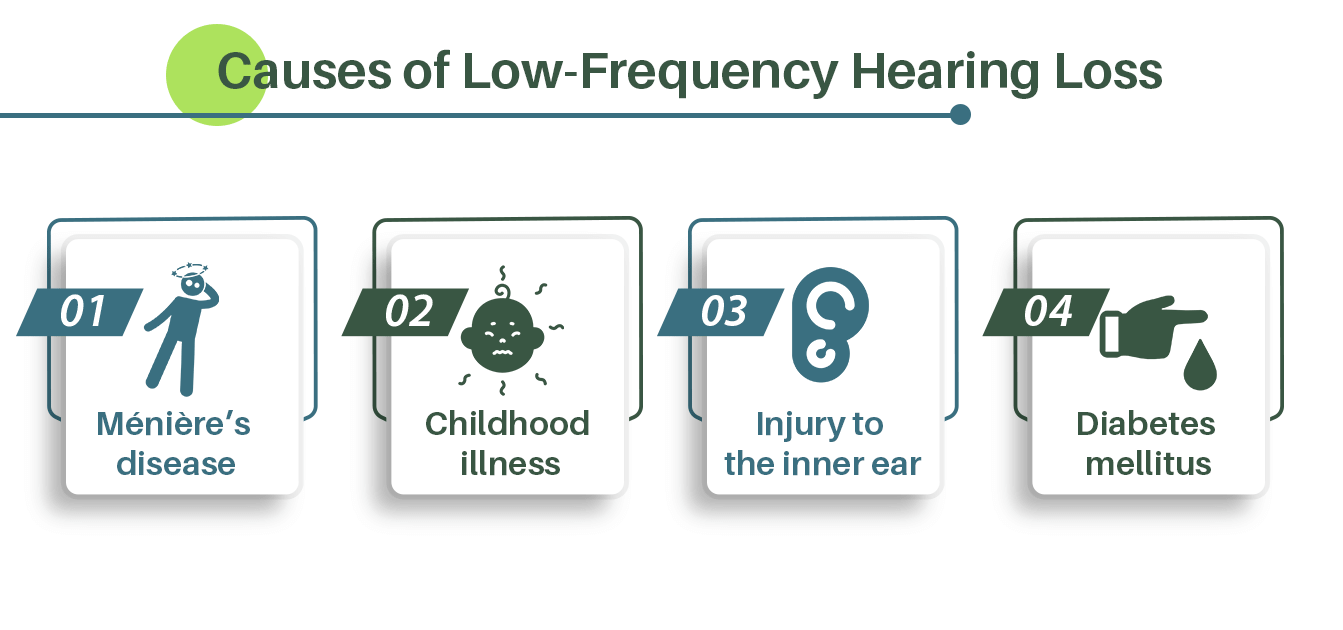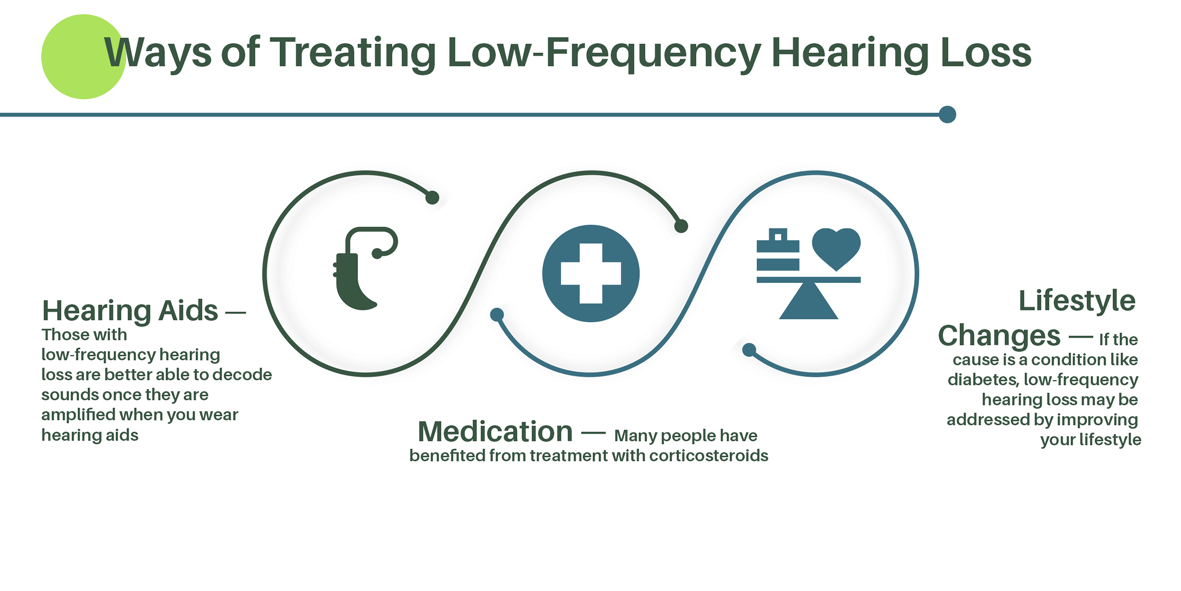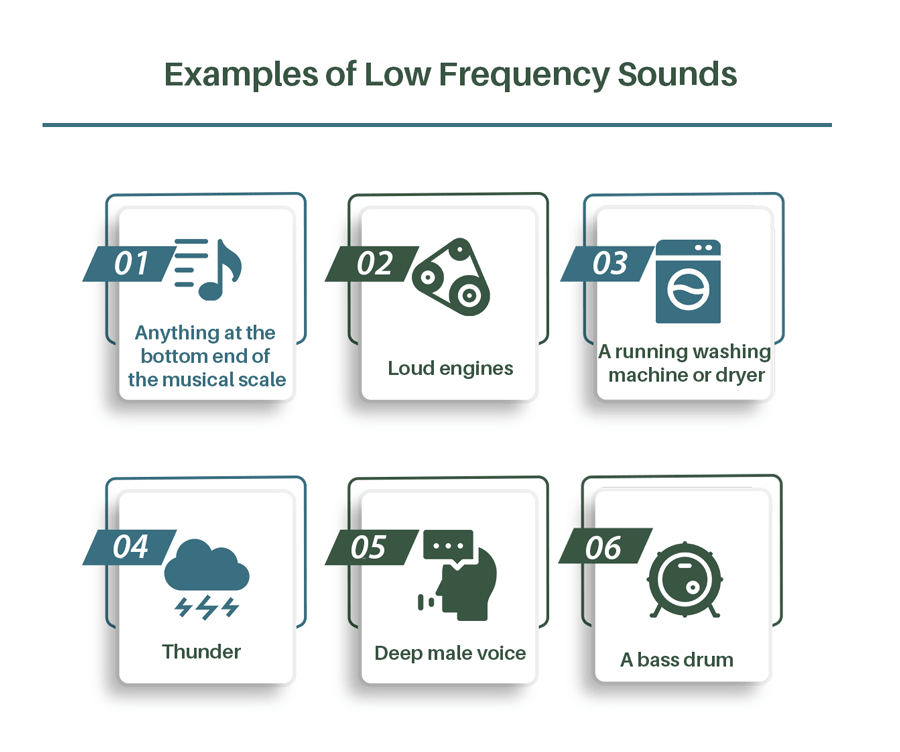Unfortunately, you may no longer be all about that bass. Low-frequency hearing loss is a relatively rare condition, insidious in that it may be more difficult to notice. However, while it may interfere with rocking out to your favorite songs, it’s also very treatable.
Key Takeaways: Low-Frequency Hearing Loss
- Low-frequency hearing loss is less common than high-frequency hearing loss.
- It is sometimes considered asymptomatic, as you may not notice difficulty hearing lower tones.
- Its cause is not well understood, though it may be associated with an underlying condition.
- Generally, it does not get worse with age, unlike more common types of hearing loss.
- Other common symptoms include tinnitus and feeling like your ear is full.
- Low-frequency hearing loss is very treatable with hearing aids and medication.
What Is Low-Frequency Hearing Loss?
As you might expect, low-frequency hearing loss involves a diminished ability to hear low-pitched sounds. It is also sometimes known as reverse-slope hearing loss, which refers to the shape this sort of hearing loss creates when it is graphed on a standard chart. It is a type of sensorineural hearing loss, meaning it involves damage to the hair cells in the inner ear.
Reverse-slope hearing loss is relatively rare and much less common than high-frequency hearing loss [1]. In general, we tend to lose the more delicate hair cells that detect high frequencies at the upper end of our hearing range easier, either to damage, disease, or age [2].
Additionally, it’s commonly a form of sudden hearing loss, rather than a gradual loss. Unlike other types of hearing loss, it may not get worse throughout your life. Unusually, you may regain some ability to hear a lower tone sound [3].
How It Affects Your Hearing
Low-frequency hearing loss is sometimes thought of as asymptomatic. There aren’t as many important bass sounds throughout our day, so a person may not notice the loss. For example, normal speech is usually higher in tone.
On the other hand, your own voice has a comparatively low frequency. A common symptom of low-frequency loss is having a hard time trying to hear your own spoken speech or trying to hear vowel sounds, both of which are often lower in tone.
As we’ve already mentioned, unlike other types of sensorineural hearing loss, you may regain some ability to hear low pitch sounds again. However, a relapse with renewed difficulty hearing lower frequencies is also likely.
Causes of Reverse-Slope Hearing Loss
The causes of low-frequency hearing loss are not entirely understood. Most cases of reverse slope hearing loss are usually associated with some other condition. As a result, it’s often seen as a symptom.
The most frequently cited cause may be Ménière’s disease, an autoimmune disorder that can affect hearing, balance, and your ability to hear low-pitched sounds [4]. Other causes of reverse-slope hearing loss include:

- Childhood illness.
- Injury to the inner ear.
- Diabetes mellitus.
Additionally, low-frequency hearing loss has occurred as a result of spinal anesthesia [5]. It may also have a genetic cause, for example, as seen in Wolfram syndrome which also causes optic atrophy [6].
Signs of Low-Frequency Hearing Loss
When it involves low-pitched sounds, the signs of hearing loss may often not be noticed. One of the chief symptoms is a reduced ability to hear sounds that have a lower pitch. As we’ve noted, that sort of loss may not be immediately obvious.
Some contexts that might make the loss more apparent include:
- Difficulty with phone conversations.
- More difficulty hearing men’s voices.
- Difficulty hearing against background noise.
- Tendency to stand close to speakers.
Other symptoms that may be easier to notice include:
- A feeling of ear fullness or congestion.
- Tinnitus, that may stop then reoccur.
- Hearing loss in only one ear.
- Vertigo.
- More common among women.
One thing to note is that you may also have trouble hearing high-frequency sounds. It’s possible both may occur at the same time. The only way to confirm a diagnosis, however, is by taking a hearing test.
Diagnosing Low-Frequency Hearing Loss
Some of the best online hearing tests can be a good place to start. However, a diagnosis will eventually have to be made by a hearing professional after a more detailed hearing test. They will use standard hearing tests that measure hearing levels at different frequencies.
Keep in mind that, while your concern may be with low-frequency hearing loss, a test will also assess your ability to hear high-pitched sounds.
Treating Noise Induced-Hearing Loss
In most cases, sensorineural hearing loss is permanent. With low-frequency hearing loss, however, it’s not out of the question to wonder, “can hearing loss be reversed?” Frequently, it may indeed be permanent, but there are occasions in which it will reverse itself. It’s not something you can count on, however, so it’s important to seek treatment.
Additionally, hearing loss can lead to other communication disorders and mental health issues if left untreated. An audiologist can provide medical advice about the best option in your case.

Hearing Aids
A person with difficulty hearing low frequencies may actually benefit more from hearing aids. Even with the right amplification, people with high-frequency hearing loss may have trouble interpreting sounds, particularly speech.
Those who suffer from low-frequency hearing loss, however, are better able to decode sounds once they are amplified when you wear hearing aids. A model with state-of-the-art hearing technology such as the MDHearingAid VOLT+ will allow you to engage easily in conversation.
Medication
Hearing aids may be worth considering in some cases. However, some medications may also help as treatment. In particular, many people have benefited from treatment with corticosteroids. Combining steroids with other treatments has also been successful [7].
Lifestyle Changes
Lifestyle changes may not make a tremendous difference. Those with low-frequency hearing loss find the condition is often associated with an underlying condition. As a result, wearing earplugs and improving your diet won’t have as much of an impact. However, a root cause, like diabetes, can be addressed by improving your lifestyle. It never hurts to be in better health.
FAQ
Check out these simple answers to common questions on reverse-slope hearing loss.
What Are Examples of Low Frequency Sounds?
Anything at the bottom end of the musical scale is of a lower frequency. Other examples include:

- Loud engines.
- A running washing machine or dryer.
- Thunder.
- Deep male voice.
- A bass drum.
Can Earwax Cause Low Frequency Hearing Loss?
Earwax is probably not a cause of low-frequency hearing loss. Its purpose is to protect the outer ear from bacteria, dust, and other detritus. The source of low-frequency hearing loss is the fine hairs in the inner ear, where there shouldn’t be any earwax.
What Are the Signs of Low-Frequency Hearing Loss?
Other than difficulty hearing low-pitched sounds, the two most common symptoms are:
- Tinnitus: Either continuous or recurring.
- Ear fullness: A sensation that your ear is full or congested.
You may also find it’s harder to hear men’s voices, your own voice, or vowel sounds in words, all of which tend to be low-pitch sounds.
Conclusion
It may seem like low-frequency hearing loss is less serious than the high-frequency version. It’s uncommon and responds well to several treatment options. However, it may also be a sign of a more serious condition, such as autoimmune disorder Meniere’s disease.
References:
- Park, Myung Jin, et al. “Clinical Characteristics and Short-Term Outcomes of Acute Low Frequency Sensorineural Hearing Loss with Vertigo.” Clinical and Experimental Otorhinolaryngology, Korean Society of Otorhinolaryngology-Head and Neck Surgery, June 2018, https://www.ncbi.nlm.nih.gov/pmc/articles/PMC5951067/.
- Zahnert, Thomas. “The Differential Diagnosis of Hearing Loss.” Deutsches Arzteblatt International, Deutscher Arzte Verlag, June 2011, https://www.ncbi.nlm.nih.gov/pmc/articles/PMC3139416/.
- Psillas, George, et al. “Hearing Outcome of Low-Tone Compared to High-Tone Sudden Sensorineural Hearing Loss.” International Archives of Otorhinolaryngology, Thieme Revinter Publicações Ltda, Jan. 2019, https://www.ncbi.nlm.nih.gov/pmc/articles/PMC6331312/.
- “What Is Ménière’s Disease? – Diagnosis and Treatment.” National Institute of Deafness and Other Communication Disorders, U.S. Department of Health and Human Services, 13 Feb. 2017, https://www.nidcd.nih.gov/health/menieres-disease.
- Schaffartzik, Walter, et al. “Hearing Loss after Spinal and General Anesthesia: A… : Anesthesia & Analgesia.” LWW, Dec. 2000, https://journals.lww.com/anesthesia-analgesia/Fulltext/2000/12000/Hearing_Loss_after_Spinal_and_General_Anesthesia_.32.aspx.
- Hogewind, Barend F T, et al. “Autosomal Dominant Optic Neuropathy and Sensorineual Hearing Loss Associated with a Novel Mutation of WFS1.” Molecular Vision, Molecular Vision, 12 Jan. 2010, https://www.ncbi.nlm.nih.gov/pmc/articles/PMC2805421/.
- Choi, Hyeog Gi, et al. “Clinical and Audiologic Characteristics of Acute Low-Tone Sensorineural Hearing Loss: Therapeutic Response and Prognosis.” Korean Journal of Audiology, The Korean Audiological Society and Korean Otological Society, 2011, https://www.ejao.org/journal/view.php?number=204.





Leave a Reply